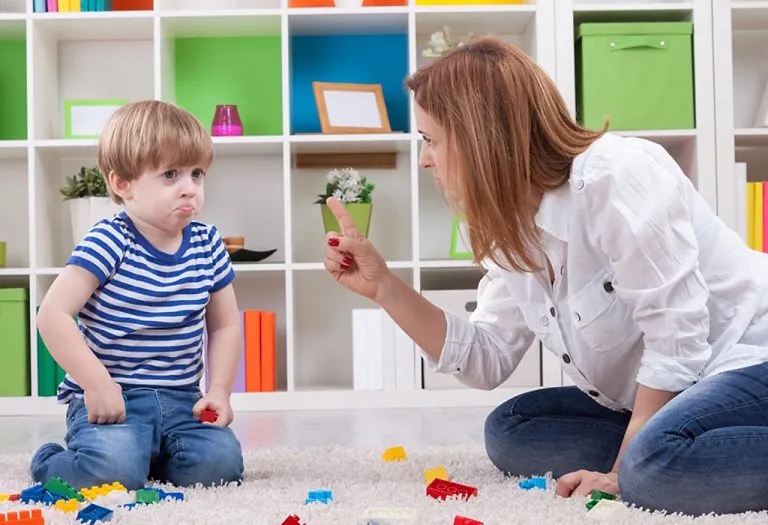Authoritarian Parenting – Characteristics and Pros & Cons

- What Is the Authoritarian Style of Parenting?
- What Are the Characteristics of Authoritarian Parents?
- Causes of Authoritarian Parenting Style
- Pros & Cons of Authoritarian Parenting
- Effects of Authoritarian Parenting on Kids
- How Does It Affect the Parents?
- Is Authoritarian Discipline the Best Way to Raise Children?
- Tips to Change Your Style of Parenting
- FAQs
When a child is born, they have no understanding of discipline, manners, or social expectations. The style of parenting adopted plays a crucial role in shaping a child’s character, confidence, and emotional well-being. Among the various approaches, authoritarian parenting is characterised by its strict rules, high expectations, and limited flexibility. While some parents believe this style fosters discipline and respect, it can also significantly impact a child’s mental and emotional growth. Understanding the characteristics, causes, and effects of authoritarian parenting is important for parents who want to strike the right balance between discipline and compassion. Exploring both its pros and cons can help families decide whether this parenting style is the best fit for their child’s long-term development.
What Is the Authoritarian Style of Parenting?
Also termed as autocratic parenting, this turns a family into more of a ruling empire where kids need to adhere to the wishes of the parent. Authoritarian parents demand a lot from their kids and make their high expectations clear. But that is rarely complemented with support, guidance, or feedback and instead met with constant disapproval or negative comments about the child’s behaviour.
An authoritative parenting example consists of making all family decisions unilaterally without considering your children’s opinions, using physical punishment as a disciplinary measure, or imposing severe consequences on a child who receives a poor grade
What Are the Characteristics of Authoritarian Parents?
Here are some of the characteristics that authoritarian parents exhibit (1).
1. Adhering to the Rules and Expectations in a Strict Manner
Such parents want their kids to grow exactly the way they want (2). Asking questions is often perceived as an aberration and a devaluation of parental authority. Such parents believe that only they know the right way to raise their child, and the child has no say in the matter. Any enjoyment and fun are unwelcome, and life becomes similar to living under a dictatorial regime, where anything the parents say is no different from an order.
2. Delivering Punishment for Mistakes or Breaking of Rules
Any mistake committed or boundary crossed results in the child being severely punished. The child is not allowed to voice his side of the argument since that is considered irrelevant by the parents. The result is all that matters, and a child is punished if he commits any mistake.
3. Not Responding to a Child’s Questions or Requests
The only thing a child is supposed to do is adhere to what’s asked of him and expected of him, without fail. Any other conversations are deemed irrelevant and are not met with an acknowledgement. Even when the child successfully manages to adhere to all the expectations, the feedback would still be of expecting a lot more the next time, without any praise or acknowledgement of the present achievement.
4. Emotionally Disconnected from a Child’s Core Love
Authoritarian parents view raising a child in the same way as a ringmaster would view taming a wild animal. There is no emotional attachment of any sort, and all that parents focus on is making sure that the child listens to their orders and becomes successful. The lack of expressing any emotions or forming deep bonds of trust and care is thrown out of the window. The emotional needs are ignored, and the behaviour is controlled by the promise of love that is rarely shown.
5. The Absence of Any Semblance of Choice or Voice of the Child
There are no avenues for children to express their opinions or choices, even in simple matters such as choosing which toy they would like or what they would like to eat. Parents look down upon the child as an inferior entity who is yet to match up to a level they have established for him. The child is expected to follow along and comply with whatever is asked of them or presented to them.
6. Extreme Criticism
The authoritarian parenting approach employs shame and criticism to compel children to adhere to household rules. These parents believe that continuous criticism effectively motivates their children and encourages compliance without any objections. Frequent yelling at children is typical in these families. Such parent-child interactions can alienate children from their parents rather than foster closeness.
7. Impatient Behaviour Towards the Child’s Doings
Authoritarian parents expect their children to know how to behave appropriately, even in unfamiliar or challenging social situations. When children fall short of these expectations and behave in undesirable ways, they are met with an angry and impatient response from their parents. Additionally, children raised by authoritarian parents may rebel or act impulsively, leading to conflicts
8. Lack of Trust
One outcome of authoritarian parenting is that parents lack trust in their children’s ability to make the right choices, perform well academically, or exhibit socially acceptable behaviour. This absence of confidence in their decision-making abilities denies children the opportunity to make their own choices. They miss out on learning essential life lessons that arise from the consequences of those choices, which hinders their development of crucial adult skills.
Causes of Authoritarian Parenting Style
Authoritarian parenting often stems from a mix of personal upbringing, cultural influences, and psychological factors. Parents may believe strict discipline ensures respect and obedience, but the underlying causes can vary.
1. Parental Upbringing
Parents who were raised in strict households may adopt the same style, considering it the “right” way to raise children.
2. Cultural and Social Norms
In some cultures, obedience and discipline are deeply valued, which encourages parents to follow authoritarian practices.
3. Fear of Losing Control
Parents may fear that a lenient approach will lead to disobedience or failure, pushing them to enforce rigid rules.
4. Stress and External Pressures
Work stress, financial struggles, or lack of support may lead parents to use control as a way of managing their child’s behaviour.
Pros & Cons of Authoritarian Parenting
Authoritarian parenting has both positive and negative effects on children. While it may promote structure and discipline, it can also affect emotional well-being. Understanding both sides helps parents decide if this style aligns with their family values.
Pros
Authoritarian parenting does offer certain benefits, particularly in terms of discipline and order.
- Clear Rules and Structure: Children develop a strong understanding of boundaries and expectations.
- Discipline and Responsibility: Strict routines may encourage punctuality and accountability.
- Respect for Authority: Kids often learn to follow rules and respect authority figures, which can benefit them in school and social situations.
- Focus on Achievement: The pressure to perform can sometimes lead to strong academic or extracurricular success.
Cons
Despite the benefits, authoritarian parenting can create long-term challenges for children’s emotional and social development (3).
- Low Self-Esteem: Children may feel undervalued, as their opinions are rarely considered (4).
- Fear-Based Obedience: Instead of genuine respect, kids may follow rules out of fear of punishment.
- Poor Social Skills: Lack of open communication can make children less confident in expressing themselves. They often struggle in new environments and social situations (5).
- Increased Risk of Anxiety or Rebellion: Harsh rules can lead to stress, resentment, or rebellion in adolescence. It also builds social anxiety in children (6).
- Strained Parent-Child Relationship: Children may feel distant or disconnected from their parents.
Effects of Authoritarian Parenting on Kids
The authoritarian style of parenting affects kids in different ways. It can impact them mentally, emotionally, and socially. Know in detail the impact of authoritarian parenting on kids:
Existential Effects
- Most children who grow up under the authoritarian style of parenting suffer from low self-esteem and inferiority issues. Since their opinions are never valued or acknowledged at home, they start to feel that the same applies to the outside world as well.
- The transactional nature of the authoritarian style of parenting is where their worth is acknowledged only when they have met certain expectations or behaved in a specific manner. When the kids fail to do so, it begins to reflect on themselves that they may not be good enough, which can result in a manic need to be perfect.
- If someone tries showing them affection or tries to be a friend to them, they will constantly feel that these people have a hidden agenda and expect something out of them. This will cause them to struggle with forming relationships or to place a value tag on each one.
- Since authoritarian parents disable the possibility of choice and opinions early in life, such kids fail to recognise their own needs or gut feelings of what they want to do or what they like. Exercising their own will or listening to that inner voice is a phenomenon rarely known by such kids.
- They do not understand how to take responsibility into their own hands and lead it successfully. Such kids end up loving the hierarchical authority-based institutions and systems, where following orders strictly satisfies them, and they feel they will be safe and accepted.
- Such acceptance of authoritarian systems leads to kids becoming submissive in nature. They will fear trying out new things or experimenting with newer techniques, and instead, prefer to remain in the comfort zone of rigidity and rules.
Mental Effects

- Since their behaviour is either rewarded or punished, most kids grow up believing in a black and white nature of the world. They fail to see the complexities and confusion present in nature and in people.
- Due to a narrow outlook on life, such children rarely develop their own thought processes or philosophies for living their lives. They adhere to what they have been taught and tend to live life traditionally, without making room for new views and opinions to emerge.
Emotional Effects
- Since showing any strong emotions has met with dire consequences, such kids exist in denial and bottle up their feelings inside without displaying them. They tend to present a trouble-free, emotionally dead, superficial personality. Their outlook often results in well-behaved behaviour due to the consequences of misbehaviour (7).
- Being taught that having such emotions is a bad thing, they begin viewing themselves as an evil person and might unleash their frustrations outward in anger, or implode inward and result in depression (8).
- This causes problems in building emotionally intimate relationships later in life, since they view everything as a transaction and having a hidden plan.
- These kids are constantly worried about their own behaviour and live in perpetual stress of being correct all the time. They feel like an invisible eye is watching their every move and are extremely critical of themselves.
- This extreme self-criticism then begins to manifest within themselves as shame and guilt. If they do end up being punished, they concur that they are inherently bad and there is no saving grace.
Social Effects
- Kids with authoritarian parenting fail to develop good friendships or long-lasting intimate relationships. They view everything based on value and what they can get from the other person.
- They begin to view power, and especially physical power, as the ultimate tool of success. Display of power over the weak helps them feel good about themselves.
- They thrive in hierarchical behaviour and try to emulate it within their own families since that is the only way they know how to function in a social context.
- On the opposite spectrum, such kids might find breaking the norm exciting and become attached to antisocial elements who buck the norm, living their lives by disregarding any kind of authority.
- These kids consequently end up having a higher chance of being susceptible to drug abuse and being involved in juvenile crimes.
How Does It Affect the Parents?
Most parents act and behave in the same way as their own parents behaved with them. It is a vicious cycle that keeps passing down from generation to generation. In some instances, certain children may grow up to realise how detrimental such a parenting style is, and instead, raise their own children the right way.
Authoritative Vs Authoritarian Parenting Style
They might sound the same, but they are extremely different from each other. Authoritarian parents make use of strict rules and break down the very individuality of the child in an effort to raise them.
Authoritative parents are strict, but they complement it with genuine love. Their rules and expectations are not rigid and are flexible to suit the child’s behaviour. Even when they know they are right, they will still allow the child to voice his side of the argument and then explain why it isn’t correct. Punishment is administered, but in a way that teaches the child rather than making them suffer for it.

Is Authoritarian Discipline the Best Way to Raise Children?
A substantial number of studies contradict this style of parenting. Although parents subjectively might feel their kid is growing up the right way, in a wider social context and a longer individual one, the kid ends up being disturbed and results in problems later in life.
Tips to Change Your Style of Parenting
An authoritarian parenting style does no good for children. Kids end up being sad and afraid. Hence, parents should adopt a parenting style in which kids feel secure and are not afraid to share any problem. If you follow an authoritarian style of parenting, here are some tips to change your approach and raise your kids with love.
- Don’t immediately become a loving parent right from day one. Your child will likely be caught off guard and further distrust you. Bring about the change gradually.
- Be patient with your child when he makes a mistake. If you see your own anger rising, take a break and come back to the matter at hand later.
- Start listening to your child. Encourage him to talk to you slowly. He might not be used to it and will take some time to feel comfortable sharing things with you and trusting you with them.
- Let your child make mistakes. Instead of making him feel guilty, ask him why he thinks the mistake happened. Work with him to let him learn how to avoid it from happening again. Hug him and let him know you trust him.
- Don’t be a serious parent. Maintain a balance of firmness and friendliness for your child. More of a figure that guides and has fun along as well.
FAQs
1. What is the difference between authoritarian and authoritative parenting?
Authoritarian parenting emphasises strict rules with little room for discussion, whereas authoritative parenting strikes a balance between discipline and warmth, fostering open communication.
2. Can authoritarian parenting affect a child’s mental health?
Yes, children raised under authoritarian parenting may develop anxiety, low self-esteem, or difficulty making independent decisions due to constant pressure and lack of emotional support.
3. Are there any benefits of authoritarian parenting?
Yes, children may become disciplined, respect authority, and perform well academically. However, these benefits often come at the cost of emotional growth.
4. Can authoritarian parents change their parenting style?
Yes, with awareness and effort, parents can shift toward a more balanced style, such as authoritative parenting, which promotes discipline while fostering emotional connection.
Parenting children the right way is undoubtedly a challenge, and they do need to be disciplined from time to time. However, doing it the right way is far more important than just getting it done. Children grow up just the way their parents shape them to be, and with the right parenting, they will end up making you proud, and they, too, will be proud to have parents like you.
Also Read:
Permissive Parenting
Gentle Parenting
Slow Parenting Style
Peaceful Parenting Style
Was This Article Helpful?
Parenting is a huge responsibility, for you as a caregiver, but also for us as a parenting content platform. We understand that and take our responsibility of creating credible content seriously. FirstCry Parenting articles are written and published only after extensive research using factually sound references to deliver quality content that is accurate, validated by experts, and completely reliable. To understand how we go about creating content that is credible, read our editorial policy here.
1. Choosing Therapy – Authoritarian Parenting: Definition, Characteristics, & Effectiveness
2. PubMed Central – Parenting Styles: A Closer Look at a Well-Known Concept
3. Michigan State University – Authoritarian parenting style
5. MDPI – Consequences of Parenting on Adolescent Outcomes















.svg)
















